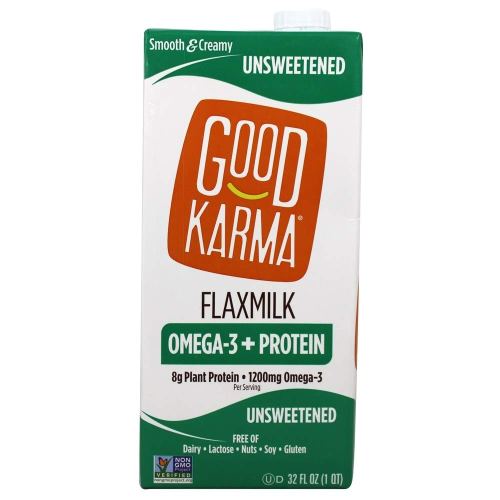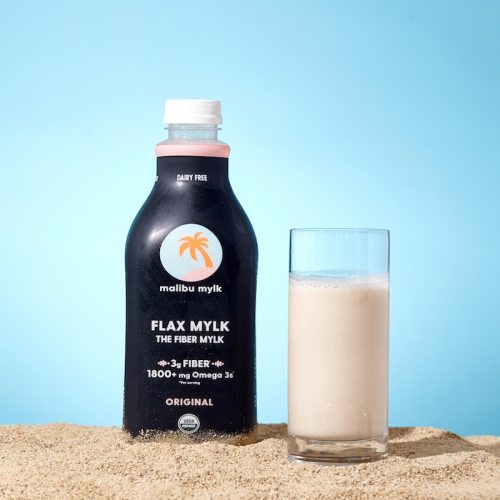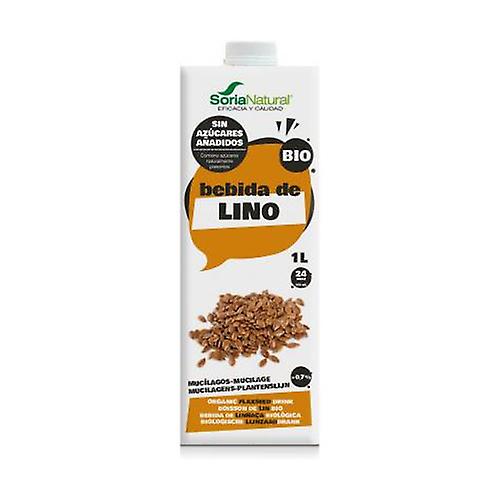Our editors independently select these products. Making a purchase through our links may earn Well+Good a commission
Flax Milk Is the Nut-Free Alt-Milk Full of Heart-Healthy Omega-3s
A registered dietitian explains the benefits of flax milk and reveals how it compares to cow's milk and other vegan milks.

There’s no denying that the alternative milk scene has truly exploded. Several years ago, if you were vegan or sensitive to dairy, you were lucky if your local grocery store stocked one dairy-free milk substitute. Now, pardon the pun, but holy cow! There’s no shortage of options to choose from. Unless you’re allergic to nuts, that is.
Experts in This Article
Aja Gyimah, RD, is a Toronto-based registered dietitian and the founding RD of kuudose.
According to food allergy awareness non-profit FARE, the most common food allergies in the U.S. include dairy, nuts, and soy (among others). That automatically nixes a lot of options from both the dairy- and dairy-alternative aisles. Because of this, many are turning to a more allergy-friendly option: flax milk.
“It’s a great alternative milk option for people who are allergic to nuts or soy,” nutrition expert Aja Gyimah, RD says. As you probably gleaned from its name, flax milk is sourced from flaxseeds, a golden yellow seed sourced from flax plants. It’s made similarly to other vegan milks: the seeds are mixed with water and blended in a high-power blender; it just takes about 10 seconds to make your own flax milk.
In terms of taste, flax milk has a mild, slightly nutty flavor. Because of this, some brands add sugar to sweeten it—something Gyimah says to be mindful of by checking the nutrition panel.
Flax milk may be a great allergy-friendly option, but how does it stack up nutritionally? Here, Gyimah breaks it down, explaining the benefits and revealing how it compares nutritionally to cow’s milk and other popular alt-milk options.
Watch the video below to see which alternative milk is one registered dietitian’s favorite:
Flax milk benefits
When it comes to any alternative milk, Gyimah says it’s important to know that the main ingredient is actually water; you don’t need very much of the seed, nut, bean, or other source to make the milk. Because of that, she says that many alternative milks are not very strong sources of nutrients—and that goes for whichever one you’re reaching for. “Cow’s milk, on the other hand, is considered more nutrient-rich because it has protein, calcium, and vitamin D,” Gyimah says.
With that disclaimer appropriately called out, Gyimah says that there are some benefits of this particular alt milk, primarily due to the flaxseeds themselves. Here, she highlights the biggies to know.
1. It’s a good source of healthy fats.
“The nutrient in flax milk that sticks out to me the most is the polyunsaturated fat content; it’s a good source of omega-3 fatty acids,” Gyimah says. “When you look at other types of dairy alternatives, you aren’t getting the same amount of polyunsaturated fats.” She explains that these types of fats—which describe omega-3 and omega-6 fatty acids—are good for both brain and heart health. If you don’t eat animal products and are allergic to nuts, it can be hard to get enough of these important healthy fats, which is where flax milk can come in handy.
2. It has trace amounts of fiber and protein.
While it bears repeating that flax milk is primarily water, flaxseeds themselves do contain both protein and fiber, so you are getting a small amount of that benefit through flax milk. But Gyimah says cow’s milk and soy milk are much better sources of protein, both having a higher protein amount than flax milk.
3. Fortified flax milk contains vitamin D.
When choosing a flax milk, Gyimah strongly recommends choosing one that is fortified. “Fortified flax seed milk contains vitamin D, which is a nutrient many people are deficient of,” she says. Vitamin D is important for both gut health and immune health, so it’s important not to miss out.
4. It’s sustainable.
Gyimah says that another perk of flax milk is that it’s a great environmentally friendly option. Flax seeds are typically grown in small quantities and don’t require as much water to grow as most nuts.
Compared to other alternative milks, Gyimah says flax milk is a great one to go for if you want to up your intake of omega-3s and omega-6s, directly benefiting your brain and heart in the process. But she issues a reminder to go for fortified flax milk, which will have a richer nutrient profile. “I like this as an option compared to most other vegan milks, with the exception of soy milk, which has a stronger nutritional profile,” Gyimah says. “Also, cow’s milk, cow’s milk has more protein, calcium, and vitamin D.” Still, overall she says it gets her seal of approval.
3 brands to try
Want to give it a try? Here are three brands to consider, all fortified—just as Gyimah recommends.

Good Karma Flax Milk — $5.00
This flax seed milk is also made with pea protein, upping the protein to eight grams per serving. Fortified with vitamin D and B12, one serving has 25 percent of the recommended vitamin D for the whole day.

Malibu Mylk, Flax Milk — $7.00
This flax milk has three grams of protein, three grams of fiber, and of course lots of omega-3s.
ThirdLove Just Launched Bras That Help Balance Your Body Temperature—Here’s Why That’s a Game-Changer for Women in All Life Stages

These Are the Only Types of Underwear You Should Be Wearing, According to Gynecologists

These Are the Summer Essentials You Should Bring With You Every Time You Leave the House, According to a Derm and an RD


Soria Natural Flax Milk — $7.00
Organic with no added sugar, this flax milk is made with simple ingredients you can feel good about.
Each alternative milk has its own pros and cons. When it comes to flax milk, the biggest pro is its heart-healthy fats. Of course it’s just as important to like the taste. Give it a try—it just might become your new favorite dairy-free substitution.
Oh hi! You look like someone who loves free workouts, discounts for cutting-edge wellness brands, and exclusive Well+Good content. Sign up for Well+, our online community of wellness insiders, and unlock your rewards instantly.
Sign up for the Well+Good SHOP Newsletter
Get exclusive deals on wellness, beauty, fitness, and food products that have been hand-picked by our editors.
Got it, you've been added to our email list.







